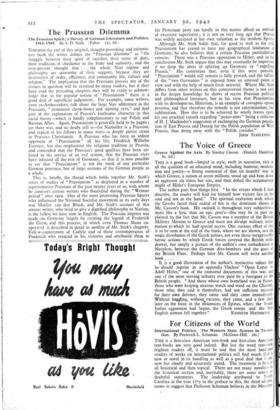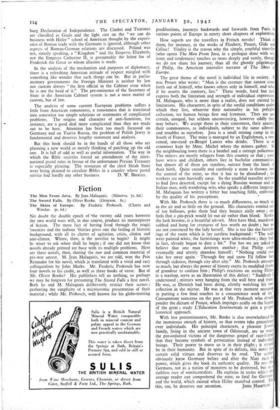For Citizens of the World
This is a first-class American text-book and first-class American text-books are very good indeed. But lest the word text-book frighten readeri off, it must be said that the most hardened readers of works on international politics will find much that is new or novel in its handling as well as a good deal that is not new but clearly and accurately stated. The treatment is first of all historical and 'then topical. There are not many novelties ill the historical section and, inevitably, there are some errors or doubtful statements. The leadership attributed to North Carolina in the year 5775 in the preface to this, the third edaion• seems to suggest that Professor Schuman believes in the Meci:leo' burg Declaration of Independence. The Cimbri and Teutones are classified as Gauls and the light cast on the "we can do business with Hitler " school of American thought by the experi- ence of Roman trade with the Germans is ignored, although other aspects of Roman-German relations are discussed. Poland was not, strictly speaking, a " Kingdom " and the Empress Elizabeth, not the Empress Catherine II, is presumably the bitter foe of Frederick the Great to whom allusion is made.
In the analysis of the mechanism and purposes of diplomacy, there is a refreshing American attitude of respect mingled with something like wonder that such things can be. But in parlia- mentary governments the Foreign Minister is neither by law nor custom always " the first official in the Cabinet even when he is not the head of it." The pre-eminence of the Secretary of State in the American Cabinet system is not a mere matter of custom, but of law.
The analysis of some current European problems suffers a little from American remoteness, a remoteness that is translated into. somewhat too simple solutions or statements of complicated problems. The origins and character of anti-Semitism, for instance, are a good deal more complicated than they are made out to be here. Attention has been too much focussed on Germany and on Tsarist Russia, the problem of Polish Jewry is fundamental and deserves lengthy statement and analysis.
But this book should be in the hands of all those who are planning a new world or merely thinking of patching up the old one. It is full of odd as well as useful information. The way in which the Bible societies forced an amendment of the inter- national postal rules in favour of the unfortunate Persian Treasury is especially pleasing. The resources of the chief Shiah State were being drained to circulate Bibles in a couniry whose postal service had hardly any other business. D. W. BROGAN.



























 Previous page
Previous page